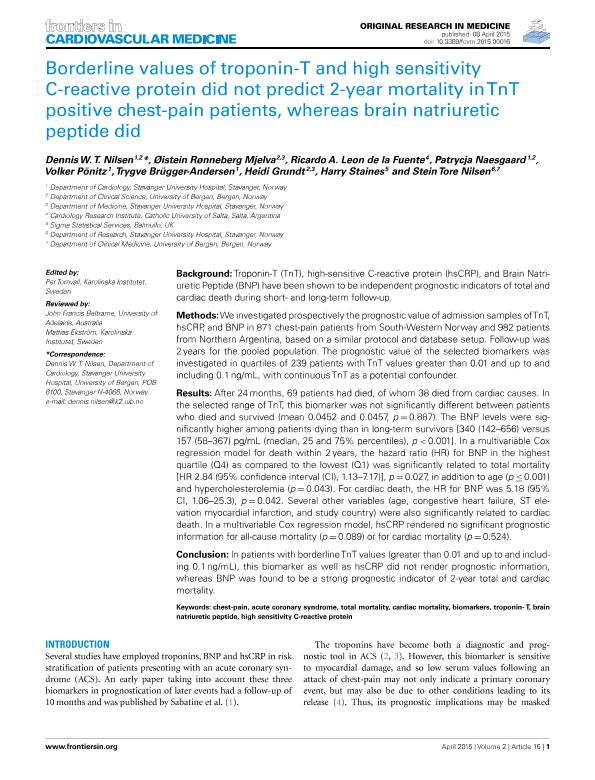Artículo
Borderline Values of Troponin-T and High Sensitivity C-Reactive Protein Did Not Predict 2-Year Mortality in TnT Positive Chest-Pain Patients, Whereas Brain Natriuretic Peptide Did
Nilsen, Dennis W. T.; Mjelva, Øistein Rønneberg; Leon de la Fuente, Ricardo Alfonso ; Naesgaard, Patrycja; Pönitz, Volker; Brügger Andersen, Trygve; Grundt, Heidi; Staines, Harry; Nilsen, Stein Tore
; Naesgaard, Patrycja; Pönitz, Volker; Brügger Andersen, Trygve; Grundt, Heidi; Staines, Harry; Nilsen, Stein Tore
 ; Naesgaard, Patrycja; Pönitz, Volker; Brügger Andersen, Trygve; Grundt, Heidi; Staines, Harry; Nilsen, Stein Tore
; Naesgaard, Patrycja; Pönitz, Volker; Brügger Andersen, Trygve; Grundt, Heidi; Staines, Harry; Nilsen, Stein Tore
Fecha de publicación:
04/2015
Editorial:
Frontiers
Revista:
Frontiers in Cardiovascular Medicine
ISSN:
2297-055X
Idioma:
Inglés
Tipo de recurso:
Artículo publicado
Clasificación temática:
Resumen
Background: Troponin-T (TnT), high-sensitive C-reactive protein (hsCRP), and Brain Natriuretic Peptide (BNP) have been shown to be independent prognostic indicators of total and cardiac death during short- and long-term follow-up. Methods: We investigated prospectively the prognostic value of admission samples of TnT, hsCRP, and BNP in 871 chest-pain patients from South-Western Norway and 982 patients from Northern Argentina, based on a similar protocol and database setup. Follow-up was 2 years for the pooled population. The prognostic value of the selected biomarkers was investigated in quartiles of 239 patients with TnT values greater than 0.01 and up to and including 0.1 ng/mL, with continuous TnT as a potential confounder. Results: After 24 months, 69 patients had died, of whom 38 died from cardiac causes. In the selected range of TnT, this biomarker was not significantly different between patients who died and survived (mean 0.0452 and 0.0457, p = 0.887). The BNP levels were significantly higher among patients dying than in long-term survivors [340 (142–656) versus 157 (58–367) pg/mL (median, 25 and 75% percentiles), p < 0.001]. In a multivariable Cox regression model for death within 2 years, the hazard ratio (HR) for BNP in the highest quartile (Q4) as compared to the lowest (Q1) was significantly related to total mortality [HR 2.84 (95% confidence interval (CI), 1.13–7.17)], p = 0.027, in addition to age (p ≤ 0.001) and hypercholesterolemia (p = 0.043). For cardiac death, the HR for BNP was 5.18 (95% CI, 1.06–25.3), p = 0.042. Several other variables (age, congestive heart failure, ST elevation myocardial infarction, and study country) were also significantly related to cardiac death. In a multivariable Cox regression model, hsCRP rendered no significant prognostic information for all-cause mortality (p = 0.089) or for cardiac mortality (p = 0.524). Conclusion: In patients with borderline TnT values (greater than 0.01 and up to and including 0.1 ng/mL), this biomarker as well as hsCRP did not render prognostic information, whereas BNP was found to be a strong prognostic indicator of 2-year total and cardiac mortality.
Palabras clave:
Cardiovascular
,
Disease
,
Biomarkers
,
Prognostic
Archivos asociados
Licencia
Identificadores
Colecciones
Articulos(SEDE CENTRAL)
Articulos de SEDE CENTRAL
Articulos de SEDE CENTRAL
Citación
Nilsen, Dennis W. T.; Mjelva, Øistein Rønneberg; Leon de la Fuente, Ricardo Alfonso; Naesgaard, Patrycja; Pönitz, Volker; et al.; Borderline Values of Troponin-T and High Sensitivity C-Reactive Protein Did Not Predict 2-Year Mortality in TnT Positive Chest-Pain Patients, Whereas Brain Natriuretic Peptide Did; Frontiers; Frontiers in Cardiovascular Medicine; 2; 16; 4-2015; 1-10
Compartir
Altmétricas



